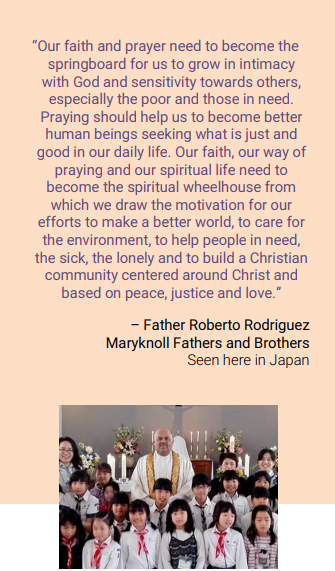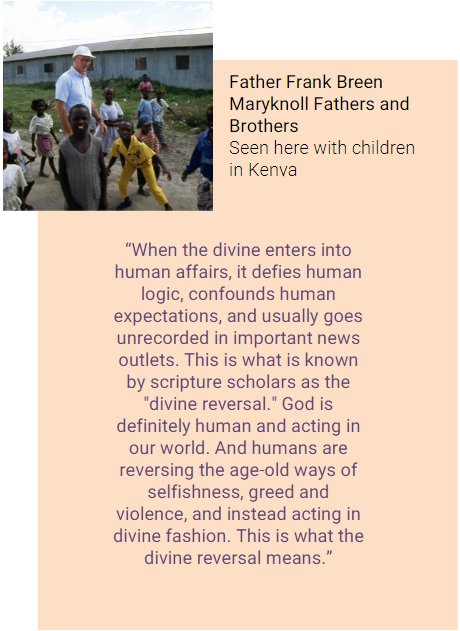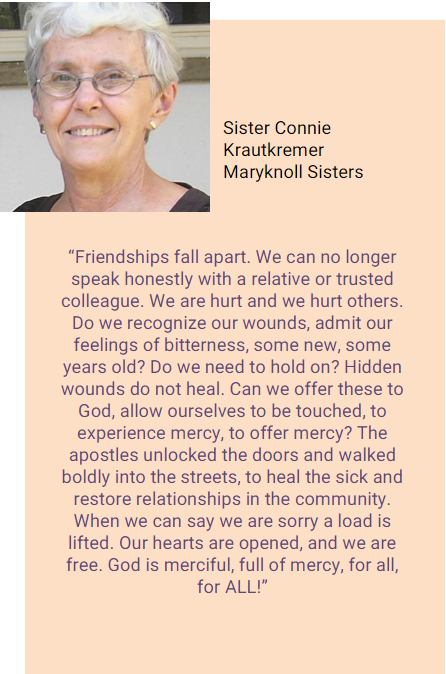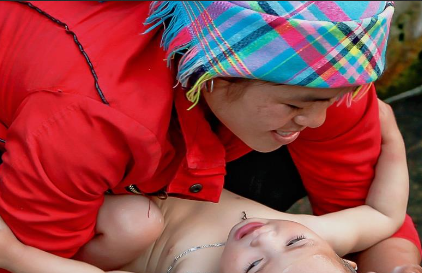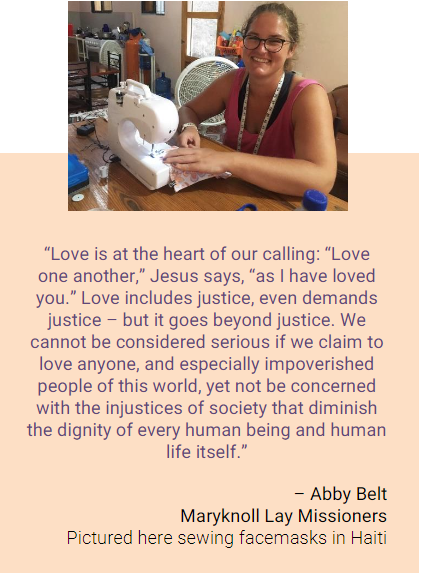The Advent Season begins Nov. 27, 2022. Advent offers us all a special opportunity to grow in our relationship with God and to deepen our commitment to Jesus’ way of life, rooted in nonviolence.
The 2022 Advent Reflection Guide: Living Gospel Nonviolence from the Maryknoll Office for Global Concerns contains reflections, questions, prayers, and actions based on each week’s Gospel reading and the experience of Maryknoll missioners who have lived and worked with marginalized communities impacted by injustice and violence conflicts in Africa, Asia, and Latin America.
We invite you to use this guide individually or in small groups to reflect upon your life patterns, to pray more deeply, and renew your spirit to face the realities of our world.
This advent guide was produced by the Maryknoll Office for Global Concerns.
First Week in Advent: Hope for Peace in all Things
“Stay awake! For you do not know on which day your Lord will come.”
– Matthew 24:42

Hope implies something unrealize — a “not yet.” The candle is a light in the darkness, yet the darkness remains. Candlelight does not banish all darkness. Christ will, eventually. But as we wait, winter envelops us, the days grow shorter, nights longer. The candlelight offers only a glimpse of what is to come — a beacon in the persistent dark.
Darkness and violence often threaten to overcome our world. War, climate disaster, staggering food insecurity, all leading to unprecedented numbers of people on the move. Lies and division make solutions elusive. Nonviolence is the light that shines in the darkness.
In the corners of the world where we light the flame of nonviolence, it proves surprisingly capable of driving out darkness. Studies show strategic, active nonviolence to be strikingly effective at preventing, transforming, and healing from violence. And yet so many in the world pursue more violence, even as purported means to achieve peace. The violence of weapons. Violence against our common home. The violence of exclusion, discrimination, and indifference.
Only Christ will ever completely overcome violence in the world. But, like the candles in the Advent wreath, we are called to be signs of Christ’s gospel nonviolence on Earth. We are called to keep the flame alight no matter how much darkness surrounds us.
Nonviolence is a spirituality, a way of life, and an ethical framework to guide our actions. It is, as Pope Francis called it, “a style of politics for peace.” It involves integral disarmament: disarming ourselves, internally and spiritually, letting go of the violence in our hearts in order to then disarm the world. We must build the conditions for peace. We must confront and resist violence with agape love. We must be always open to dialogue, even with our enemies. We must refuse revenge, and instead seek healing and reconciliation.
By fostering this spirit of nonviolence, studying and practicing nonviolence in all its facts, we keep our flame lit, and remain vigilant against the darkness. Today’s gospel calls us to stay awake as we await the coming of the Messiah. We invite you to tend the flame of nonviolence in your heart and in the world throughout this Advent season. We begin with a prayer, that we might begin to disarm our hearts, kindling the spirit of nonviolence, becoming an ever-brighter light in the darkness.
And soon, another candle will be lit. And then another, and another, until Emmanuel, God among us, is born.
Questions for Reflection:
What issue of violence, whether direct, cultural, or structural, challenges you? Where do you see signs of hope that violence can be overcome?
Prayer
Disarm me, God
Come, put away the sword I still carry somewhere in my heart. Take away the violence that lingers in my soul. Make me an instrument of Your peace. You have a plan for me: fulfill it! In this world of armaments, disarm me and I shall be able to disarm others.
Come, God. There is still a trace of war and madness in my veins. Purify me, O God, and I shall let loose disarmament in the world that will cause people to praise you freely. Purify me of all violence and I shall stand before the powers and principalities without fear and free of those trapped in the structures of fear and violence.
Come, God. Disarm me without my knowing it, and then, show me that you are the Disarming One, nonviolent from the beginning of time until the end of time. Disarming Presence, Unconditional Love, Great Reconciler, Suffering Servant, Patience Personified, Peaceful Mother, come, bearing peace.
Come, God. Disarm this restless heart which wanders off into apathy and selfishness, but which longs to rest in You. Lead this heart into the fire of your Love, where it can be consumed by the Flame of Nonviolence, setting fire to other hearts nearby. Let your unilateral disarmament engage me, wine me over, force the scales to fall from my eyes and the weapons to be released from my hands. Push me into the violent hearts of others that I may take on their anger and release them from the chains of hatred and the bonds of violence.
Disarm me, God, and I shall disarm others. Disarm me, God, that I may be one with all humanity, all your sons and daughters. Disarm me, God, and bring me into Your reign, to live forever in peace and love.
-Prayers of Protest, by John Dear, S.J.
Second Week in Advent: Prepare your heart to turn towards peace
Sunday, December 5, 2021
“For this is he who was spoken of by the prophet Isaiah, saying. The voice of one crying in the wilderness: ‘Prepare the way of the Lord; make his paths straight.”
– Matthew 3: 3
Who warned you to flee from the coming wrath? Produce fruit in keeping with repentance.” As we prepare the way for the Lord, John the Baptist challenges us to face the most difficult realities in our lives and in our world.
Ours is a culture that too often encourages magical thinking: Protect corporations and billionaires, and wealth will trickle down to poor and working families. Fight wars to achieve peace. End crime and undocumented migration by hiding people away in prisons. End racism by not talking about racism. Simply think about what you want, and it will manifest itself. Again and again, we are told to hide, destroy, or ignore what is hard or painful, and trust that good things will be ours.
Out of the desert and into this cacophony of snake oil sales pitches appears John with a different kind of prescription: go to the hard place. Do the work of healing and reconciliation.
John’s call is echoed in the gospel call to nonviolence. When we commit to nonviolence, we recognize different forms of violence and our participation. We must repent of violence — whether direct, physical violence or systemic and structural violence, the violence of attack and exploitation or that of exclusion and indifference.
The very word nonviolence speaks to this discernment: it is not simply non-violence, or the absence of violence. Nonviolence requires that we recognize violence and its root causes in order to resist and transform it.
Let us consider our interior attitudes and interpersonal relationships, but also engage in social analysis: how do I participate in structures that perpetuate violence? Economic exploitation, racism and other forms of discrimination, the destruction of the environment and contribution to climate change are all forms of violence. When we vote for leaders who spend trillions of dollars on weapons while failing to fund human needs, and we pay taxes into that system, we are complicit in violence.
In committing to nonviolence, the Maryknoll Lay Missioners have identified three ways nonviolence is expressed vis-à-vis violence: prevention, intervention, and restoration/reconciliation. The second step is like the sacrament of reconciliation: intervention requires naming and repenting sinful behavior. Restoration and reconciliation mean rebuilding right relationships. And prevention means developing new behaviors that seek the common good.
Nonviolence is the path to peace with justice: it produces “fruit in keeping with repentance.” As we prepare the way for the Lord, let us identify and repent of the violence in our lives.
Questions for Reflection:
What is a crooked path in your life that blocks peace? Who is a voice in the wilderness calling you to turn toward peace?
 Prayer
Prayer
O Lord,
who has mercy on all,
take away from me my sins and mercifully kindle in me the fire of your Holy Spirit.
Take away from me the heart of stone and give me a heart if flesh,
a heart to love and adore you,
a heart to delight in you,
to follow and to enjoy you,
for Christ’s sake.
-Saint Ambrose
Third Week in Advent: Rejoice, for the Lord is near
Sunday, December 12, 2021
“Go and tell John what you hear and see: the blind regain their sight, the lame walk, lepers are cleansed, the deaf hear, the dead are raised, and the poor have the good news proclaimed to them.”
– Matthew 11: 4-5
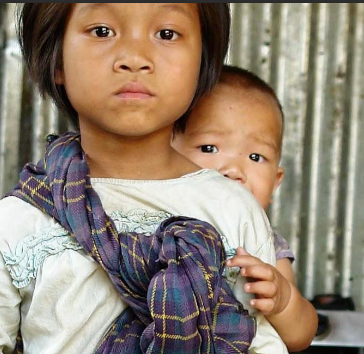
When the imprisoned John the Baptist sends followers to inquire whether Jesus is “the one who is to come,” Jesus replies by pointing to the signs he has performed. “Go and tell John what you hear and see.” The blind see, the lame walk, good news is proclaimed to the poor. As we reflect this Advent on gospel nonviolence, what are the signs of the nonviolent Jesus at work in the world today?
We do well to look first to the examples of women. Years before the events of today’s reading, Mary, pregnant with Jesus, meets Elizabeth, pregnant with John, and expresses in the Magnificat the significance of the incarnation for bringing about just peace: by becoming her humble child, God “has brought down the powerful from their thrones and lifted up the lowly; he has filled the hungry with good things, and sent the rich away empty.”
Today as well, women often model nonviolence as the path to just peace. Pax Christi International’s Catholic Nonviolence Initiative has documented striking examples of effective, active nonviolence by women leaders:
In the Philippines, peace activist Myla Leguro developed a method of dialogue to prepare individuals and communities for negotiations to settle land disputes. Her process builds skills, trust, and agreements that serve as a basis for addressing wider conflicts. It has been adopted in conflict zones around the world, including central Africa, where other leaders have further developed her model.
In northern Kenya, Pax Christi peacebuilder Elizabeth Kanini Kimau facilitated dialogue between warring pastoralist communities. Understanding the respect afforded elders, she invited elders from all sides to dialogue in a safe, neutral location. The elders recruited warriors to follow suit, who in turn invited youth. The elders have since established ongoing dialogue to resolve conflicts before they erupt into violence.
In Syrian refugee camps in Lebanon, Operazione Colomba’s Sara Ionovitz opened spaces for dialogue from the grassroots to top-level state actors through “popular democratic diplomacy,” allowing refugees to contribute plans for peace to negotiations for the first time. The presence of her team also built bridges of dialogue between Syrians and the Lebanese host population.
Let us pause this week to notice the prophets of nonviolence in our world, to recognize the leadership of women, and see the signs of God with us, where nonviolence has led to peace with justice.
Questions for Reflection:
What gives you joy during this Advent Season? What peacebuilding trait do you see in a women leader you can name?
 Prayer to the Creator
Prayer to the Creator
Lord, Father of our human family,
you created all human beings equal in dignity:
pour forth into our hearts a fraternal spirit
and inspire in us a dream of renewed encounter,
dialogue, justice and peace.
Move us to create healthier societies
and a more dignified world,
a world without hunger, poverty, violence and war.
May our hearts be open
to all peoples and nations of the earth.
May we recognize the goodness and beauty
that you have sown in each of us,
and thus forge bonds of unity, common projects, and shared dreams.
Amen
-Prayer by Pope Francis
Fourth Week in Advent: Trust in God’s peace
Sunday, December 19, 2021
“All this took place to fulfill what the Lord had said through the prophet: ‘Behold, the virgin shall be with child and bear a son, and they shall name him ‘Emmanuel,’ which means ‘God is with us.'”
– Matthew 1: 22-23
Joseph was distraught at the news that Mary would have a baby. He thought of divorcing her quietly, not accusing her of infidelity, but leaving her and the child. But the angel of God greets him with the words of divine consolation frequently uttered throughout Scripture: “Be not afraid.” The angel advises Joseph to neither accuse Mary nor quietly leave her, but to remain by her side, and receive her child, who is God with us.
We often feel overwhelmed by the circumstances in our lives and in our world. We may be tempted to seek an easy way out, or even to respond in ways that betray our faith in a compassionate God. Throughout the last year, the world has watched in horror as the Russian invasion of Ukraine has led to a brutal and drawn-out war. Like Joseph, we are driven by compassion and concern, but we may despair of finding an appropriate response.
Throughout the war, however, Pope Francis has worked unrelentingly to bring God’s message of peace through nonviolence to the people of Ukraine, Russia, and the world. It is difficult to tell the victims of war, as the bombs drop, “Be not afraid.” But Francis has surely heard the angel’s message, and he has addressed the war almost daily, denouncing the invasion, insisting repeatedly that conflict can never be solved with violence, that war is never just, while remaining sensitive to the excruciating decisions Ukrainians face, and the moral complexities of defending one’s home and community in a world that has failed to invest adequately in developing and employing nonviolent tools for preventing and confronting violence.
We must always be open to dialogue, Francis says, even with the aggressor. “It smells bad, but it has to be done.”
Repeating a message from 2017, he says, “One hundred years ago, Benedict XV… described the war as a ‘useless massacre.’ Disassociating oneself from the so-called ‘reasons for the war’ seemed to many to be almost an affront. But history teaches that war is always and only a useless massacre. Let us help each other… to embark on paths of nonviolence and paths of justice, which favor peace. Because in the face of peace we cannot be indifferent or neutral…That is why we invoke the ius pacis as the right of all to resolve conflicts without violence. That is why we repeat: never again war, never again against others, never again without others!”
Questions for Reflection:
Are there relationships in your life that are in need of reconciliation, peace and mercy? Is there a situation in your life in which you need to hear ‘be not afraid?
Prayer
-“Prayer for Vocations to Peacemaking”
Dear God, the harvest is plenty and the laborers are few.
Your people long for peace,
they thirst for justice.
Send into our midst women and men
whose hearts can embrace the entire world.
Send into our midst young and old,
from all your beloved cultures and races,
Who offer their arms to life up the lowly and oppressed.
Send into our midst new peacemakers
Who will walk with the powerless,
as well as those in power
To proclaim your teaching and
To witness against hate, greed, fear and strife.
Create us anew as your peacemakers, O God,
and send us your peace.
by Pax Christi

